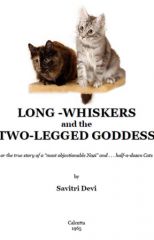
Author : Srimati Savitri Dëvi Mukherji (Maximine Portaz, Maximiani Portas)
Title : Long-Whiskers and the Two Legged Goddess or the true story of a “most objectionable Nazi” and . . . half-a-dozen Cats
Year : 1965
Link download : Savitri_Devi_-_Long-Whiskers_and_the_Two_Legged_Goddess.zip
FOREWORD. Every person and every animal in this story has actually lived or is still alive — only their names, when at all mentioned, have been altered for obvious reasons. And this is precisely why this is neither a proper “cat story” in the usual sense of the word nor a bare psychological study of human “fanaticism,” but both. True life is never as simple as alleged portraits of it. And here, we have an instance of the fundamental complexity even of that psychology often considered as the simplest of all, namely, of that of a one-pointed political “fanatic,” nay, of a militant upholder of an Ideology “of arrogance and violence” (to use the language of its enemies). Not only does the Doctrine itself, to which the heroine of this story is unconditionally devoted, appear greatly to exceed mere “politics,” when examined with the care it deserves, but the woman’s devotion as a fact, — as an experience — has unexpected roots: — roots in a whole world of values which one is not used to identify with her Ideology. In other words, our heroine’s outlook seems somewhat different from that of many of those whom she would, herself, love and respect as her brothers in faith, because her approach to National Socialism is first and foremost aesthetic, while theirs is mainly social and political. She sees it and lives it differently, because she is, whether she cares to admit it or not, different from most, or at least from many, of her comrades, even if she be as “fanatic” — as one-pointed; as uncompromising — as any of them. Fundamentally, she is in love with the beauty of life, which she beholds, unmarred, in animals, and more specially in felines; which she would like to behold in man also, but simply cannot — for man is not something complete, something “achieved,” but a creature “on its way” to something higher, when not an irretrievably fallen creature in the process of decay. Our heroine therefore cannot love humanity — not even Aryan humanity. She cannot love it, for it is not uniformly beautiful, both in physical features and character. At most, she can and does love the creature of glory, which the natural élite of her race is aspiring, — tending — to become (or re-become): Aryan man in his perfection. It is not the preoccupation of living men’s happiness — not the knowledge of her comrades’ efficiency on the social plane — that brought her to her particular faith, but the dream-like vision of those Aryan supermen as beautiful on their level, as the four-legged kings of the jungle on theirs,”1 which the élite of her race could become, under its influence. In other words, she is a National Socialist because she beholds, in Adolf Hitler’s teaching, “the one political doctrine infinitely more than political” — the only one founded upon the basic laws of Life — and the one Way of life that can lead the natural élite of mankind to its natural fulfilment in the state of supermanhood. For the more and more numerous millions of increasingly mongrelised human beings, lost for the cause of collective supermanhood, our heroine has no time. She despises them profoundly, and comes in touch with them only when she cannot do otherwise: either to defend some animal (or animals in general) against them, or against some of them; or to fight them, whenever necessary; or to use them, whenever possible, for the benefit of the Aryan cause. The “cat story” in which she is involved from the beginning goes at least to show that her eminently aesthetic approach to the alleged Ideology “of arrogance and violence” is possible, even logical — in perfect keeping, at any rate, with that which a French opponent2 of the National Socialist doctrine once called its “appalling logic.” And this precisely because true Aryan racialism, — National Socialism, to repeat its historic name, — not only is not a man-centred creed, but definitely excludes any man-centred outlook. For this very reason, this book is anything but National Socialist propaganda: most people, nearly all people nowadays, have a man-centred outlook; to tell them bluntly how life-centred a great militant faith really is, is rather to turn them against it. To those few, however, who, far from looking upon man as the source of all values and the measure of all things, merely see in him, as Friedrich Nietzsche did, “a bridge between animalhood and supermanhood,” our story might suggest the widely unpopular but, to us, quite obvious truth, that any beautiful, innocent beast — a finished handiwork of Nature, perfect on its own level — is decidedly more valuable than a human specimen that does not (or, by birth, cannot) tend towards the one thing that justifies, if at all, the existence of man: the perfection of superman; more valuable, we say, because, be it of limited scope, a finished — flawless — work of art is always better than a failure. Those might well be attracted to our heroine’s aristocratic faith, and come to it, contrarily to many of its former supporters, fully aware of its remotest implications, and therefore fully knowing what they are doing; come to it and never turn back. They would be welcome: the militant minority needs those to whom its “appalling logic” appeals without reservations. Yet, we repeat: this is not, cannot be, propaganda. For who cares for minorities in the present world? Minorities do not count; they are not dangerous — or not supposed to be ... Savitri Devi Mukherji. Written in Hanover (Germany) on the 10th of July, 1961. ...

Palmer Michael - Hiroshima revidiert
Author : Palmer Michael Title : Hiroshima revidiert Die beweise für napalm und senfgas anstatt...














